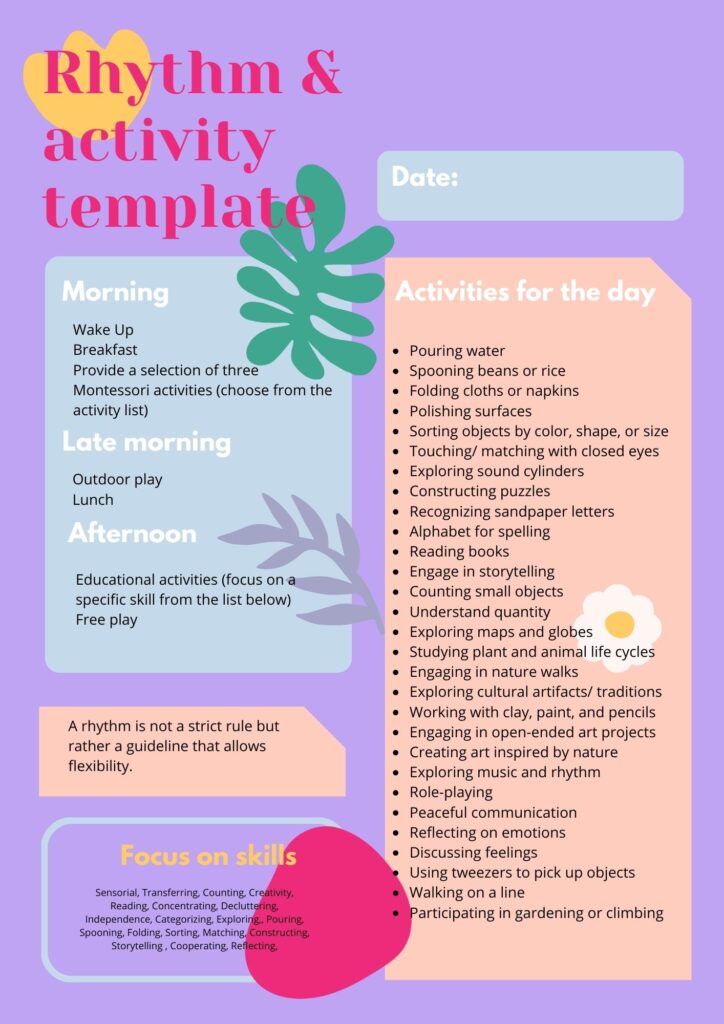Free Rythm & Activity Template
Free Rythm & Activity TemplateThe power of rhythm in activities with kids is profound, offering structure, engagement, and developmental benefits. Rhythm creates a predictable flow that children instinctively respond to, fostering a sense of security and familiarity. From simple clapping games to structured music lessons, rhythm permeates various facets of childhood activities. Read our article about the power of Rhythm in Activities.
Why Rhythm
Firstly, rhythm enhances cognitive development. When children engage in rhythmic activities like singing, dancing, or playing musical instruments, they improve their ability to concentrate, coordinate movements, and understand patterns. These activities stimulate brain regions associated with memory, attention, and language, laying a foundation for future learning.
Moreover, rhythm cultivates social skills and emotional regulation. Participating in group rhythmic activities encourages teamwork, cooperation, and empathy as children learn to synchronize their movements and actions with others. Additionally, rhythmic activities provide an outlet for self-expression, allowing children to express their emotions and relieve stress in a positive and constructive manner.
Furthermore, rhythm promotes physical health and well-being. Dancing, for instance, is not only enjoyable but also promotes cardiovascular health, coordination, and flexibility. Engaging in rhythmic activities regularly can instill healthy habits and contribute to a lifelong appreciation for physical activity.
A structured approach
A structured approach to fostering rhythm and movement in children’s daily routines holds immense benefits for their overall development and well-being. Incorporating rhythm and movement into daily activities helps children build essential skills, enhances their physical health, promotes emotional regulation, and fosters a sense of connection and belonging. Here’s why a structured approach is effective:
Development of Motor Skills: Structured rhythm and movement activities provide children with opportunities to develop gross and fine motor skills. Through activities such as dancing, clapping, and marching to a beat, children improve their coordination, balance, and spatial awareness. These activities also help strengthen muscles and enhance flexibility, laying a solid foundation for healthy physical development.
Enhanced Cognitive Development: Engaging in rhythmic activities stimulates various areas of the brain, supporting cognitive development. As children synchronize movements to rhythm patterns, they improve their ability to focus, concentrate, and process auditory information. This cognitive engagement strengthens neural connections and enhances memory and learning skills, benefiting academic performance and overall cognitive function.
Emotional Regulation: Rhythmic activities provide children with a structured outlet for expressing emotions and managing stress. Moving to a rhythm promotes relaxation, reduces anxiety, and regulates emotional arousal. Children learn to identify and express their feelings through movement, fostering emotional intelligence and resilience. Moreover, rhythmic activities such as drumming circles or group dances promote social interaction and cooperation, further enhancing emotional well-being.
Promotion of Language and Communication: Structured rhythm and movement activities offer rich opportunities for language development and communication. Through songs, chants, and rhymes, children expand their vocabulary, improve pronunciation, and develop listening skills. Participating in group activities encourages verbal communication and turn-taking, promoting social language skills and peer interaction. Additionally, rhythmic activities support language acquisition in multilingual environments by providing a fun and engaging context for language learning.
Cultural Appreciation and Diversity: Rhythm and movement are integral aspects of diverse cultural traditions around the world. A structured approach to rhythmic activities exposes children to a variety of musical styles, dance forms, and cultural expressions. Through exploration and appreciation of different rhythms and movements, children develop cultural awareness, empathy, and respect for diversity. This exposure nurtures a sense of curiosity and openness to exploring the richness of global cultures, fostering a more inclusive and interconnected worldview.
Promotion of Creativity and Self-Expression: Structured rhythm and movement activities encourage children to explore their creativity and express themselves freely. Through improvisation, interpretation, and personalization of movements, children develop a unique sense of artistic expression and self-confidence. Engaging in creative rhythmic play fosters imagination, innovation, and problem-solving skills, laying the groundwork for future creative endeavors in various domains.
Promotion of Healthy Lifestyle Habits: Regular participation in structured rhythm and movement activities contributes to the promotion of a healthy lifestyle. Physical activity improves cardiovascular health, strengthens bones and muscles, and supports overall physical fitness. By incorporating rhythmic activities into daily routines, children develop lifelong habits of physical activity and well-being, reducing the risk of obesity, chronic diseases, and sedentary behavior later in life.
In conclusion, a structured approach to fostering rhythm and movement in children’s daily routines offers a myriad of benefits for their holistic development. By providing opportunities for physical, cognitive, emotional, and social growth, structured rhythmic activities nurture well-rounded individuals who are equipped with essential skills for success in life. Moreover, rhythmic play fosters joy, creativity, and a sense of connectedness, enriching children’s lives and fostering a lifelong love of music, movement, and self-expression.
FREE RHYTHM & ACTIVITY TEMPLATE
Our template serves as a structured framework, providing a starting point and guidance for various activities. It streamlines the process, ensures consistency, saves time, and helps maintain organization. It simplifies the tasks of creating a beautiful Montessori Morning.

Inspiration
If you want to get inspired with activities, alsof check out this article about Daily activity inspiration with kids. It also contains a free download with a list of activities to choose from when creating a rhythm in activities.
In conclusion, the power of rhythm in activities with kids extends beyond mere entertainment. It serves as a catalyst for holistic development, fostering cognitive, social, emotional, and physical well-being. Incorporating rhythm into childhood activities enriches experiences and equips children with essential skills for navigating the complexities of life.
This article may contain affiliate links. If you use these links to purchase an item we may earn a commission.
Grab your free download
Explore our array of free downloads, templates, and guides designed to support your Montessori journey.




